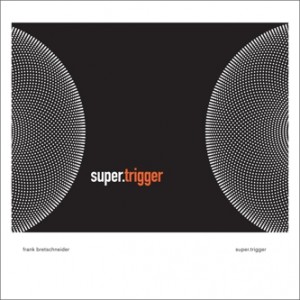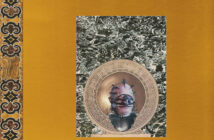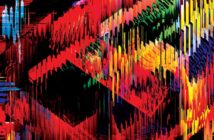
The phrase “like clockwork” is easily applicable to Frank Bretschneider, as it appears to be the guiding principle of Super.Trigger, an album that is nothing if not relentlessly German. The stereotypically metronomic lifeblood of Krautrock and Kraftwerk is alive here, and there seems to be nothing of waste. Each part of each track is necessary. While there’s a lot going on, it doesn’t sound cluttered – just considered.
Bretschneider claims the disc is absent of any “romanticism” – and that the whole affair follows simple mechanical states. On/off. Up/down. Soft/hard. Slow/fast. Loud/quiet. It’s true, opener ‘Big.Hopes’ introduces these ideas stridently, resolutely winnowing its sounds for the payoff of a minimal ending, but lurking inside the tracks is a sort of white-noise ghost in the machine. There’s no attempt at melody. It’s there almost by implication, in the middle-Eastern feel added to the starkly groovy ‘Flicker.Funk’. or in the glossolalia of robotic sibilants in ‘Day.Dream’, a track which harks back to the artist’s youthful sci-fi radio play inspiration.
Eschewing romanticism doesn’t remove character, though some tracks are more favoured in this regard. ‘Pink Thrill’ is all nerdly tetchiness, but ‘Machine.Gun’ is the clear winner. Staccato drum rolls imitate the track’s titular weapons while a frenetic background conjures the image of a gunfight held over the top of a Blaxploitation soundtrack. It crackles, and when the end comes – in an echo-chamber of steely ricochets – it’s triumphant. Worth special note too is the album’s attention to bass sounds. On some tracks – the opener ‘Big.Hopes’, and ‘Day.Dream’ in particular – there’s window-shaking kicks and tones that are so immense that it’s difficult not to fist-pump in celebration. Coupled with the appropriate atmosphere, such as the dubby, dark sound of ‘Over.Load’, it’s overwhelmingly great.
A criticism which could be levelled at Bretschneider is that he sometimes doesn’t appear to know how to end his tracks. I suppose listeners are grateful this field of music doesn’t suffer gladly the 1970s rock fade-out-over-solo idea, but across Super.Trigger is the occasional feeling the artist has thought “Fair enough – that’ll do” and hit cut, leaving some tracks to drop into the abyss, or to continue reverberating, seemingly unintentionally. It’s an interesting jolt of humanity in a selection of carefully composed pieces, but it does leave one feeling as if there’s been no great plan after all.
Album ender ‘Mean.Streak’ is particularly guilty of this, which is a shame as it’s the most organic-sounding tune on the disc – more roiling cauldron than sequenced track, it glorps along with occasional could-be-Clavinet stabs before just… ending. It’s a shame to build such personality into something and then just chop it, seemingly arbitrarily. It’s weird, given the attention that’s shown to detail elsewhere, especially for the headphone crowd.
As a collection of tracks, Super.Trigger is certainly serviceable, but it would’ve been great to see the artist Bretschneider’s shaping of forward momentum – so prevalent in so many of the tracks – used to hammer some shape into the album as a whole. His engagement with the idea of rhythm is intriguing, and there’s a real sense across the album that he’s trying to pare down the songs to their minimal parts – to make the most with the least. Though the adherence to mechanical state rules is key to this disc, it doesn’t seem to bind it together.
But for all that, by constructing its constituent elements with such precision, Bretschneider has created an interesting album which captures the attention without such cop-outs as melody. Â Like a robot attempting to swing, the sounds on Super.Trigger are both right-angled appealing and awkwardly dorky.
LUKE MARTIN



